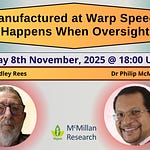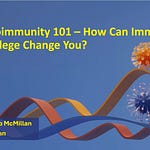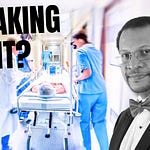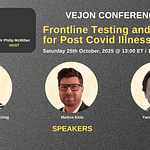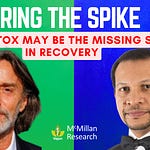When I sat down with Dr. Clare Craig, I knew it would be an important conversation—but I didn’t realize just how profound it would become. Clare isn’t just a pathologist; she’s a truth-seeker who has dared to question the narratives that shaped medicine during the COVID-19 years. From the first moment of our discussion, her humility and conviction were clear. (Timecodes below)
She described how pathology, the very foundation of medicine, has quietly drifted from its roots in evidence and post-mortem learning. As she explained, autopsies once helped doctors truly understand disease, but fear, bureaucracy, and shifting medical culture have eroded that habit of looking for truth after death. “Autopsy, autopsy, autopsy,” I said to her—and she agreed. That single act of looking could have saved us from so many wrong turns in the pandemic.
Clare admitted that she never saw herself as a rebel. She was compliant, rule-abiding, even the “head girl” type. Yet when the data no longer made sense, her scientific training forced her to question the story being told. It began with the Diamond Princess cruise ship—where mortality rates didn’t match the global panic. From that point, she knew the fear had outpaced the evidence.
We spoke about how fear shaped not only public policy but also medical behavior. When behavioral scientists admitted they deliberately increased the sense of personal threat to push compliance, the damage to public trust was sealed. “There are people,” Clare said, “who will never recover from what happened. Some remain as scared as ever, still masking, still filtering air.”
Then came the heart of our discussion—what happened inside the profession itself. Doctors, Clare said, became silent. Bound by hierarchy, fear of losing jobs, and an ingrained deference to authority, they lost their voice. Medicine, once a calling grounded in ethics, became a system of compliance. As she put it, “What is medicine without ethics?”
When vaccine mandates came for healthcare workers, Clare had already seen it coming. She tried to raise the alarm in 2020, long before the rollout. Few colleagues dared to sign her open letter. “They all knew it was coming,” she said, “and that’s why they stayed silent.” The result was 40,000 care-home workers dismissed—an act she believes crossed one of medicine’s foundational red lines: bodily autonomy.
Her words cut deep:
“The phrase ‘greater good’ is seductive, but it always means sacrifice. There has to be a minority being sacrificed for there to be a greater good. Suddenly we were in a culture of sacrifice, and nobody was calling it out.”
For Clare, the lesson is clear. Ethics isn’t an academic subject—it’s the oxygen of medicine. When fear replaces ethics, harm becomes inevitable. And when doctors stay quiet, society loses its conscience.
As we ended, she warned that digital IDs and centralized health controls could silence dissent even more effectively than censorship ever did. “We’re not in that system yet,” she said. “So we must speak now.”
That’s the message I took away from our conversation: speak now. Speak for truth, for ethics, for patients, and for the integrity of our profession.
The world will one day tell the story of this era—perhaps saying that everything worked, that the ends justified the means. But if voices like Clare Craig’s continue to rise, history may yet remember something different: that courage and conscience never disappeared, even when it was dangerous to speak.
Timecodes
0:00 – Introduction
Welcoming viewers and introducing Dr Clare Craig, pathologist and author.
1:05 – Why Clare Chose Medicine
Her early influences, family background, and love for physics.
4:25 – Pathology as the Foundation of Medicine
Why she believes diagnosis and evidence matter most.
6:45 – The Decline of Autopsies
How culture and fear have reduced post-mortem learning.
9:15 – Early Pandemic Fears
Initial fear among doctors and why some pathologists stopped autopsies.
13:10 – Were the Collapse Videos Real?
Revisiting China’s early footage and the role of misinformation.
14:55 – The Diamond Princess Moment
How data from a cruise ship changed her perception of COVID risk.
16:40 – The Manufactured Fear Campaign
Behavioral scientists and the deliberate increase of public anxiety.
18:45 – COVID Anxiety Syndrome
Long-term psychological effects of pandemic fear.
25:00 – Missteps in Hospital Care
How early treatment errors and policy decisions increased mortality.
30:00 – Birth of the HART Group
How professionals came together to challenge distorted science.
36:00 – Why Doctors Stay Silent
Systemic pressures, career fears, and the loss of open debate.
43:50 – Vaccine Mandates and Ethics
The moral failure of sacking unvaccinated healthcare workers.
51:00 – Did the Vaccines Work?
Clare’s analysis of global data and infection patterns.
1:03:00 – Rewriting History
Will future generations be told everything “worked”?
1:05:00 – A Call to the Medical Profession
Her warning on digital ID, future pandemics, and the duty to speak now.
Vejon COVID-19 Review is a reader-supported publication. To receive new posts and support my work, consider becoming a free or paid subscriber.




